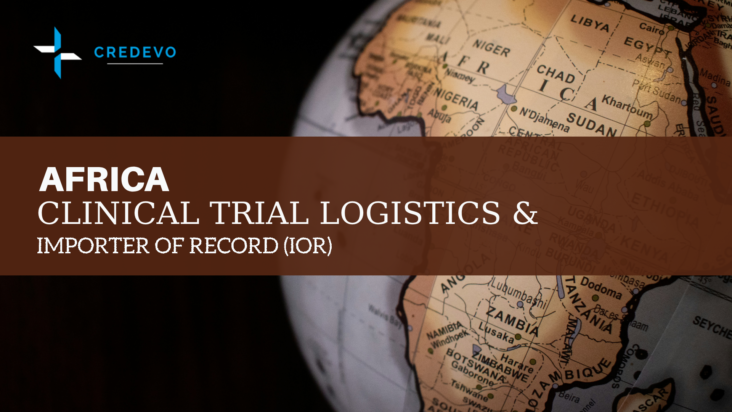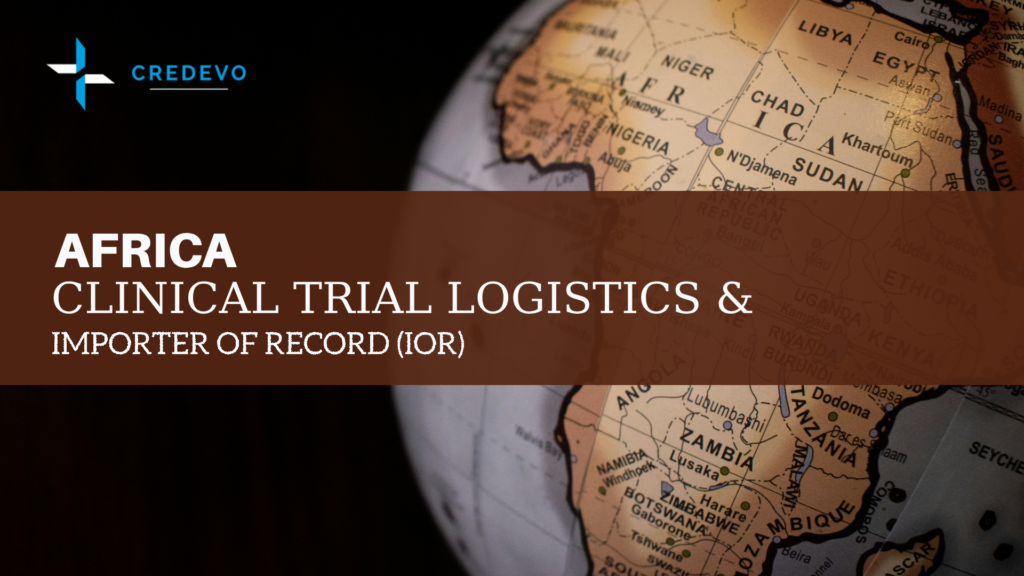Navigating Logistics Challenges In Africa With Importer Of Record (IOR) Services

In Africa, navigating logistics poses unique challenges, particularly in industries like clinical trials. However, Importer of Record (IOR) services offer a solution. By managing customs clearance and compliance, IOR services streamline clinical trial logistics, enabling organizations to focus on advancing medical research.

Poorly developed logistics systems make it difficult to deliver necessary equipment and materials to the research site. Africa leads the continents in future demographic potential, with its population predicted to nearly double by 2050, and it is experiencing a major shift in epidemiological burden, with noncommunicable illness being the primary cause of mortality and morbidity by 2030.
Let’s discuss clinical trials in Africa before we get into further detail.
Clinical trials in Africa: unlocking the potential of the emerging superpower
- Approximately 17% of the world’s population resides in 54 countries on the African continent; in the next five years, that number is predicted to reach almost two billion, but only 2.5% of global clinical trials take place here, according to some research studies.
- The population is also significantly diverse in terms of ethnicity. It also has the highest death rates from major illnesses like HIV/AIDS, malaria, tuberculosis, acute respiratory infections, and diarrheal diseases, accounting for roughly 25% of the global disease burden.
- Across Africa, there is also an increasing prevalence of non-communicable diseases such as diabetes, cancer, chronic respiratory conditions, cardiovascular disease, and hypertension.
- Based on a global benchmarking tool that uses a scale of 1-4, five African countries—South Africa, Nigeria, Egypt, Tanzania, and Ghana—are currently at maturity level three for either medicine or vaccines.
- This shows that Africa has well-established, well-organized regulatory frameworks that can monitor and ensure clinical trial quality.
This article will provide an overview of these logistics services and their role in optimizing clinical trials in Africa, emphasizing their benefits and key considerations for implementation.
Let’s see the overview of the logistics services and their role in optimizing clinical trials in Africa.
Global company’s role in clinical trials in Africa
Several global pharmaceutical and biotechnology companies conduct clinical trials in Africa. Some of these companies include:
These companies often collaborate with local research institutions, hospitals, and non-governmental organizations (NGOs) to conduct clinical trials in various African countries. Clinical trials in Africa cover a wide range of therapeutic areas, including infectious diseases (such as HIV/AIDS, malaria, and tuberculosis), non-communicable diseases (such as cancer, diabetes, and cardiovascular diseases), and other health conditions.
What is clinical trial logistics and its significance?
Clinical trial logistics ensures that everything required for a clinical study is delivered on time to research sites. The process of clinical trial supply and logistics includes closely monitoring the procurement, packaging, labeling, storage, and distribution of investigational medicinal products (IMPs), medical equipment, biological samples, and other ancillary supplies essential for a clinical trial.
It includes various steps like:
- Importation of products for clinical trials
- Batch release
- Secondary packaging
- Labeling
- Storage in controlled conditions
- Storage attestation
- Personnel training
- Collection of biological products
- Validated shipment packaging procedures: temperature control and temperature monitoring.
- Recollection of clinical supplies from investigational sites
- Return stock control
- Storage certificate
- Product disposal after authorization by the sponsor and issuing a certificate of destruction
- Re-export of study equipment
What are the logistic challenges for clinical trials in Africa?
- Inadequate ports, railroads, and roadways impede the flow of goods across Africa, severely impacting the continent’s logistics industry. Governments could collaborate with private enterprises to construct additional roadways, ports, and railway infrastructure to improve logistics efficiency and reduce transportation costs.
- Import and export regulations differ by country and location, requiring specific approaches to requirements. Clinical trial supply services must navigate these complexities to ensure a seamless journey.
- Trials might be conducted at multiple sites, including rural areas. This can have an influence on the timely supply and storage of important materials. International clinical trial couriers have to overcome these hurdles, which may include varied climate conditions, transportation issues, and accessibility limits.
- All of these factors can have an impact on the reliability and efficiency of clinical trial supply chains.
Do you require a regulatory expert who can manage the shipping on behalf of sponsors or investigators within the nation and is familiar with the local regulatory process?
If you answer “YES,” the Importer of Record (IOR) will meet all of the aforementioned criteria. Let us first define who IOR is. and their responsibilities in the clinical trial logistics of Africa.
Importer of Record (IOR) and their role in clinical trials in Africa
An authorized individual or organization that oversees the responsibility for the goods during an import is known as the importer of record. In other words, a business that is unable to import into a country on its own might do it with the help of an Importer of Record.
An IOR is accountable for overseeing the following responsibilities with care:
- Adherence to regional legal requirements
- Ensuring prompt payment of duties and taxes due
- Precise Harmonized Tariff Code Declaration
- Keeping the title of the products while exporting DaaS to a foreign market.
- Detailed Records of the Goods and Cargo
To qualify as an Importer of Record, the recipient of the shipment must be one of the following:
- A Registered Entity: A company or other legal entity with a tax ID or equivalent registration number that is recognized by the local government.
- Authorized to Import: When an organization possesses a license or authorization from their government allowing them to import goods into their nation.
Key considerations for implementing effective shipping in African clinical trials
Here are important considerations for overcoming logistics challenges for carrying out a successful clinical trial in Africa:
Regulatory compliance
- In the clinical trial supply chain, regulatory compliance is a major obstacle.
- Noncompliance with regulations may result in trial failure, higher costs, and delays. Complying with regulations might be difficult because they differ throughout nations. Stakeholders need to keep updated on local legislation to enhance regulatory compliance.
Transportation
- Transportation is a critical component of the clinical trial supply chain. This can be particularly challenging considering Africa’s hot climates and remote locations for biopharma drugs, which must be kept at specific temperatures not just during transit and storage, but also when they arrive at the trial site to dose patients.
- To ensure the success of the trials, sponsors should select sites with efficient transportation alternatives and collaborate with renowned logistics services with a high level of competence.
Strategic Planning
- A comprehensive schedule including participant recruitment, regulatory approval processes, and material procurement should be developed by the sponsor.
- It is necessary to determine any potential logistical challenges, such as import/export restrictions, shipping regulations, and country-specific documentation needs.
- Need to establish open channels of communication between supply chain partners, clinical sites, sponsors, and other relevant parties.
Effective monitoring system
- There should be an effective monitoring system that allows you to trace the shipment using a unique reference number and receive up-to-date progress data.
- Appoint a local IOR
- It is advised to appoint an IOR before site selection who is well-versed in site transport concerns, keeps up with local regulatory updates, and assumes shipping responsibility to overcome the majority of clinical trial obstacles.
Conclusion
The clinical study rate in Africa is steadily increasing, and it will remain the key focus for global pharmaceutical companies if logistical and regulatory challenges are appropriately managed. Considering Africa’s logistical advantages in clinical trial execution, sponsors can select African countries for clinical trials with low failure rates.
Are You Facing Any Logistic Challenges With Clinical Trials In Africa?
Do you have any challenges or need Importer of Record (IOR) services for clinical trials in Africa? Let’s discuss your clinical trial logistics service needs in Africa. Please provide your requirements details below to connect with our team.